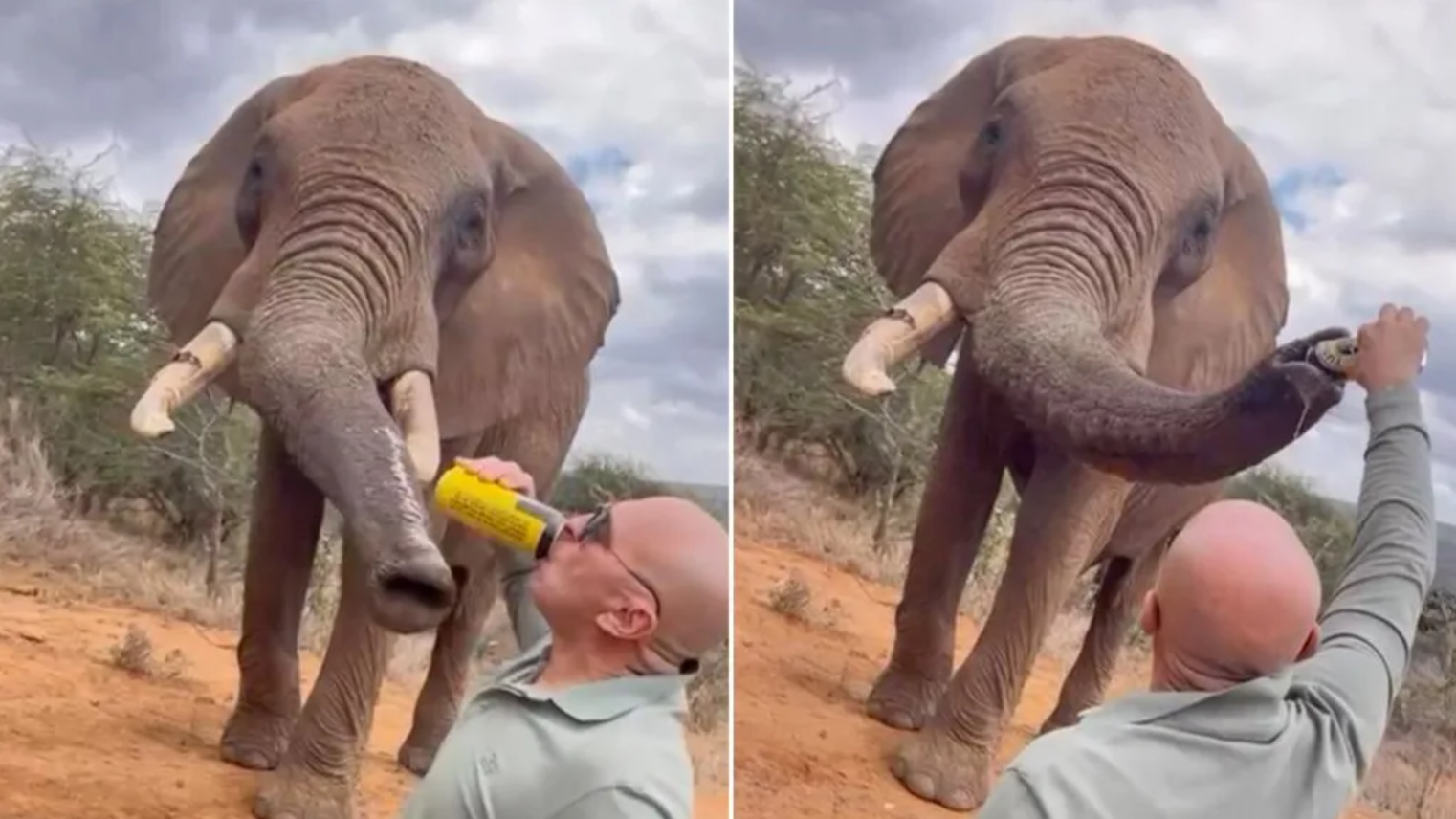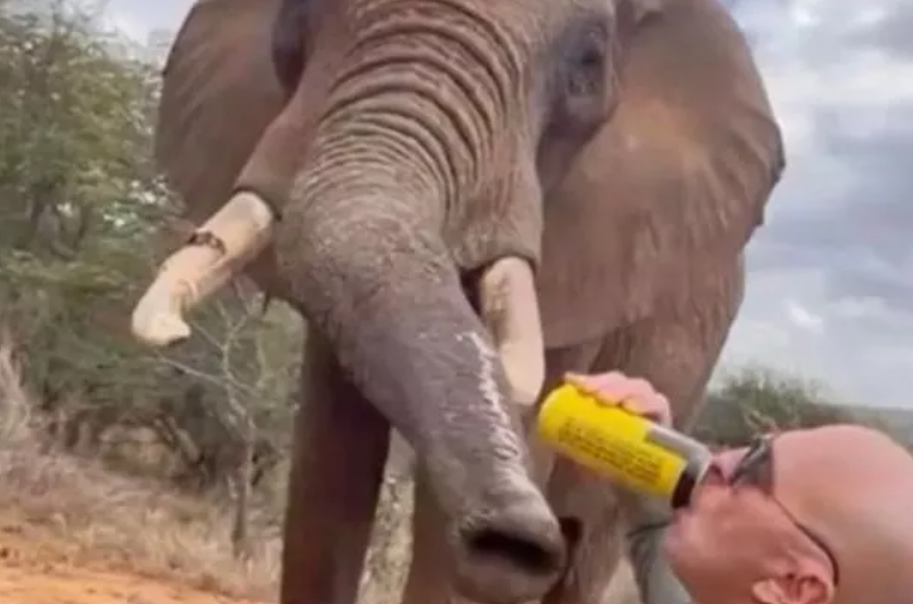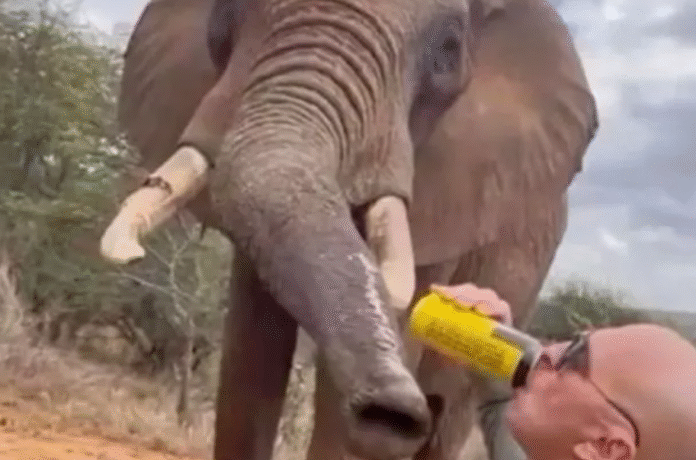Tourist Elephant Beer Incident in Kenya Sparks Global Outrage
The Tourist Elephant Beer Incident in Kenya has triggered widespread anger across social media platforms and wildlife conservation circles. A viral video shows a Spanish tourist pouring beer into the trunk of a beloved elephant, sparking investigations, condemnation, and renewed calls for stricter wildlife tourism regulations.
The man, who posts content under the name Skydive_Kenya, was filmed in a protected conservancy drinking from a Tusker beer can before handing the rest to the elephant. His caption, “Just a tusker with a tusked friend”, only fueled backlash.
While the videos were quickly deleted after outrage grew, the Tourist Elephant Beer Incident continues to dominate headlines, with conservationists warning of the dangerous precedent it sets.

Where the Tourist Elephant Beer Incident Took Place
The footage was verified by conservation experts and the BBC, who identified the location as the Ol Jogi Conservancy in Laikipia County, Kenya. The sanctuary later confirmed that the video was authentic, describing the incident as “unacceptable, dangerous, and against our values.”
A staff member at Ol Jogi, only identified as Frank, expressed disbelief:
“This should never have happened. We’re a conservation center, and we cannot allow this kind of behavior. Visitors aren’t even allowed to get near elephants, let alone feed them alcohol.”
The Kenya Wildlife Service (KWS) also launched its own investigation, emphasizing that such actions not only endanger animals but also tourists themselves.
Who Is the Elephant in the Tourist Elephant Beer Incident?
The elephant in question is Bupa, a well-known gentle giant with distinctive tusks. Bupa was rescued during a mass elephant cull in Zimbabwe in 1989 and has lived at Ol Jogi Conservancy since he was eight years old.
The sanctuary describes him as an “ambassador for conservation,” and his photos are frequently shared by visitors.
Officials said Bupa’s dignity and wellbeing were violated by the tourist’s actions, reiterating that the Tourist Elephant Beer Incident is being treated with utmost seriousness.
Conservationists Respond to the Tourist Elephant Beer Incident
Wildlife experts and biologists strongly condemned the act. Dr. Winnie Kiiru, a respected Kenyan elephant conservationist, called the behavior “reckless and irresponsible.”
She explained:
“About 95% of elephants in Kenya are wild. Encouraging people through social media posts to approach and feed them sends the wrong message. It endangers both elephants and humans.”
The Tourist Elephant Beer Incident has reignited discussions about ethical tourism, animal welfare, and the role of social media in shaping visitor behavior in protected areas.
Social Media Backlash Against the Tourist Elephant Beer Incident
Within hours, the video received hundreds of critical comments. Many Kenyans demanded that the tourist be deported immediately, while others urged for stricter enforcement of wildlife protection rules.
Despite deleting the post, the man later uploaded another clip, this time feeding elephants carrots and joking: “We are on beer time.” This only added fuel to the controversy.
The uproar has since extended beyond Kenya, with conservationists and animal lovers worldwide denouncing the incident.
Related Wildlife Tourism Controversies in Kenya
The Tourist Elephant Beer Incident comes just a week after another viral video showed tourists blocking wildebeest migration in the Maasai Mara. Visitors were seen exiting their safari vehicles, crowding riverbanks, and forcing animals into crocodile-infested waters.
Following global backlash, Kenya’s Tourism and Wildlife Ministry promised tougher regulations, better signage, and increased visitor education. Tour operators were also warned to ensure tourists remain inside vehicles in restricted areas.
Both incidents highlight the urgent need for stronger enforcement of conservation laws and responsible tourism.

Why the Tourist Elephant Beer Incident Matters
Kenya’s wildlife is among its most treasured assets, drawing thousands of tourists annually. Elephants, in particular, hold symbolic and cultural importance while also playing a crucial role in maintaining ecological balance.
The Tourist Elephant Beer Incident is more than a viral controversy, it raises serious questions about:
- How tourists interact with wildlife.
- The risks posed by irresponsible behavior.
- The pressures conservation centers face balancing tourism with animal welfare.
Experts stress that incidents like this could undermine years of conservation progress if left unchecked.
Moving Forward After the Tourist Elephant Beer Incident
In response, Ol Jogi Conservancy has pledged to review its visitor protocols and strengthen enforcement. The Kenya Wildlife Service also hinted at potential legal action against the tourist involved.
As conservationists stress, the lesson is clear: wildlife is not entertainment. Respecting boundaries ensures both human safety and animal welfare.
The Tourist Elephant Beer Incident serves as a wake-up call, one that may finally push Kenya to adopt stricter, globally recognized wildlife tourism policies.

